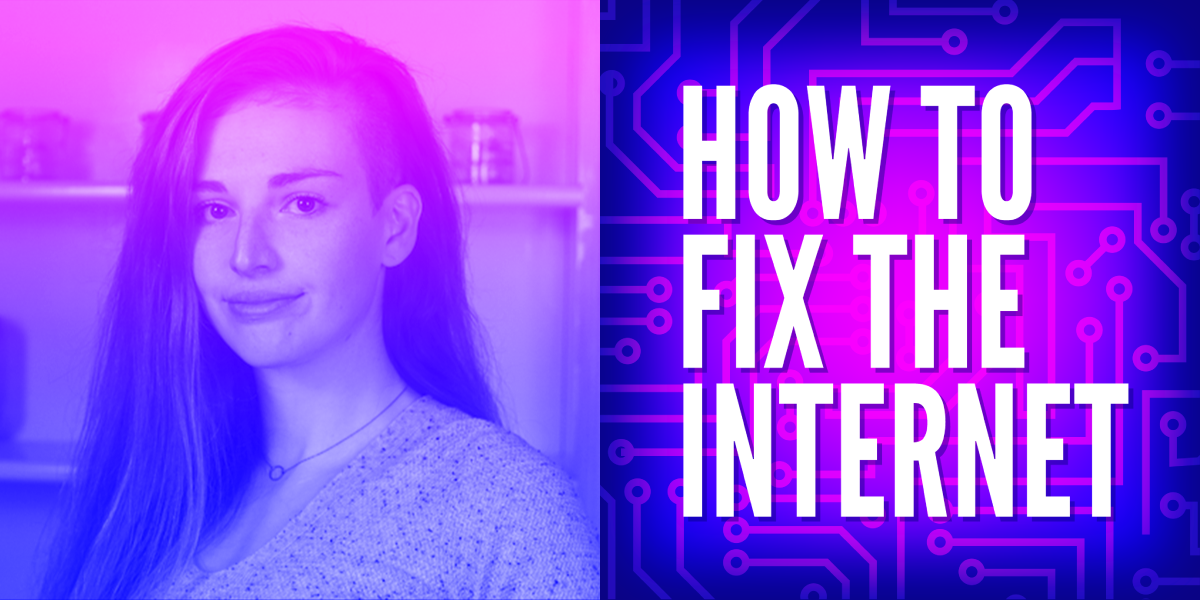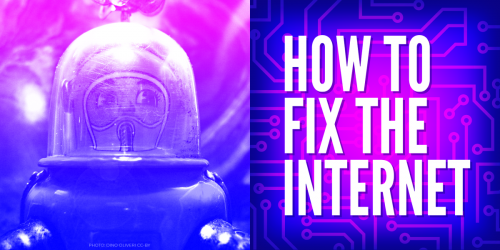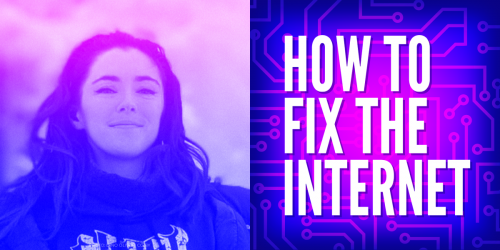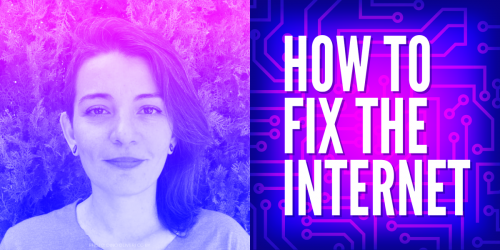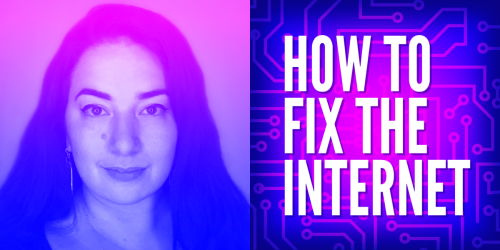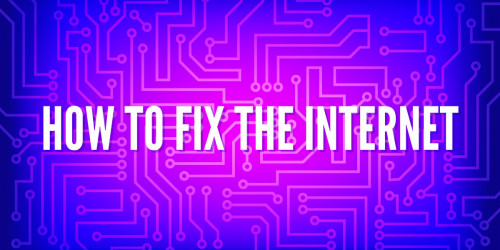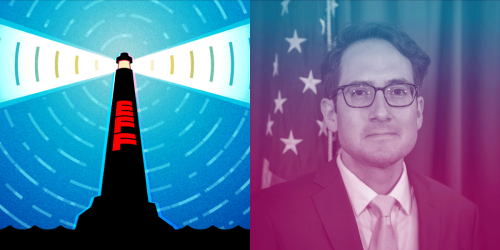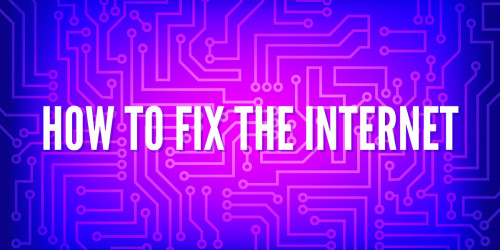There’s a weird belief out there that tech critics hate technology. But do movie critics hate movies? Do food critics hate food? No! The most effective, insightful critics do what they do because they love something so deeply that they want to see it made even better. The most effective tech critics have had transformative, positive online experiences, and now unflinchingly call out the surveilled, commodified, enshittified landscape that exists today because they know there has been – and still can be – something better.

(You can also find this episode on the Internet Archive and on YouTube.)
That’s what drives Molly White’s work. Her criticism of the cryptocurrency and technology industries stems from her conviction that technology should serve human needs rather than mere profits. Whether it’s blockchain or artificial intelligence, she’s interested in making sure the “next big thing” lives up to its hype, and more importantly, to the ideals of participation and democratization that she experienced. She joins EFF’s Cindy Cohn and Jason Kelley to discuss working toward a human-centered internet that gives everyone a sense of control and interaction – open to all in the way that Wikipedia was (and still is) for her and so many others: not just as a static knowledge resource, but as something in which we can all participate.
In this episode you’ll learn about:
- Why blockchain technology has built-in incentives for grift and speculation that overwhelm most of its positive uses
- How protecting open-source developers from legal overreach, including in the blockchain world, remains critical
- The vast difference between decentralization of power and decentralization of compute
- How Neopets and Wikipedia represent core internet values of community, collaboration, and creativity
- Why Wikipedia has been resilient against some of the rhetorical attacks that have bogged down media outlets, but remains vulnerable to certain economic and political pressures
- How the Fediverse and other decentralization and interoperability mechanisms provide hope for the kind of creative independence, self-expression, and social interactivity that everyone deserves
Molly White is a researcher, software engineer, and writer who focuses on the cryptocurrency industry, blockchains, web3, and other tech in her independent publication, Citation Needed. She also runs the websites Web3 is Going Just Great, where she highlights examples of how cryptocurrencies, web3 projects, and the industry surrounding them are failing to live up to their promises, and Follow the Crypto, where she tracks cryptocurrency industry spending in U.S. elections. She has volunteered for more than 15 years with Wikipedia, where she serves as an administrator (under the name GorillaWarfare) and functionary, and previously served three terms on the Arbitration Committee. She’s regularly quoted or bylined in news media, speaks at major conferences including South by Southwest and Web Summit; guest lectures at universities including Harvard, MIT, and Stanford; and advises policymakers and regulators around the world.
Resources:
- XOXO Festival, Portland, OR: "Molly White: Fighting For Our Web" (Aug. 24, 2024)
- This Next Thing 2024, Pontresina, Switzerland: “Molly White: Magic, Creativity, and Meaning” (June 2024)
- EFF: Blockchain
- EFF: “Decentralization Reaches a Turning Point: 2024 in Review” (Jan. 1, 2025)
- Neopets
- Wikipedia
What do you think of “How to Fix the Internet?” Share your feedback here.
Transcript
MOLLY WHITE: I was very young when I started editing Wikipedia. I was like 12 years old, and when it said the encyclopedia that anyone can edit, “anyone” means me, and so I just sort of started contributing to articles and quickly discovered that there was this whole world behind Wikipedia that a lot of us really don't see, where very passionate people are contributing to creating a repository of knowledge that anyone can access.
And I thought, I immediately was like, that's brilliant, that's amazing. And you know that motivation has really stuck with me since then, just sort of the belief in open knowledge and open access I think has, you know, it was very early for me to be introduced to those things and I, I sort of stuck with it, because it became, I think, such a formative part of my life.
CINDY COHN: That’s Molly White talking about a moment that is hopefully relatable to lots of folks who think critically about technology – that moment when you first experienced how, sometimes, the internet can feel like magic.
I'm Cindy Cohn, the Executive Director of the Electronic Frontier Foundation.
JASON KELLEY: And I'm Jason Kelley, EFF’s Activism Director. This is our podcast, How to Fix the Internet.
CINDY COHN: The idea behind this show is that we're trying to make our digital lives BETTER. A big part of our job at EFF is to envision the ways things can go wrong online-- and jumping into action to help when things then DO go wrong.
But this show is about optimism, hope and solutions – we want to share visions of what it looks like when we get it right.
JASON KELLEY: Our guest today is Molly White. She’s a journalist and web engineer, and is one of the strongest voices thinking and speaking critically about technology–specifically, she’s been an essential voice on cryptocurrency and what people often call Web3–usually a reference to blockchain technologies.. She runs an independent online newsletter called Citation Needed, and at her somewhat sarcastically named website “Web3 is going just great” she chronicles all the latest, often alarming, news, often involving scams and schemes that make those of us working to improve the internet pull our hair out.
CINDY COHN: But she’s not a pessimist. She comes from a deep love of the internet, but is also someone who holds the people that are building our digital world to account, with clear-eyed explanations of where things are going wrong, but also potential that exists if we can do it right. Welcome, Molly. Thanks for being here.
MOLLY WHITE: Thank you for having me.
CINDY COHN: So the theme of our show is what does it look like if we start to get things right in the digital world? Now you recognize, I believe, the value of blockchain technologies, what they could be.
But you bemoan how far we are from that right now. So let's start there. What does the world look like if we start to use the blockchain in a way that really lives up to its potential for making things better online?
MOLLY WHITE: I think that a lot of the early discussions about the potential of the blockchain were very starry-eyed and sort of utopian. Much in the way that early discussions of the internet were that way. You know, they promised that blockchains would somehow democratize everything we do on the internet, you know, make it more available to anyone who wanted to participate.
It would provide financial rails that were more equitable and had fewer rent seekers and intermediaries taking fees along the way. A lot of it was very compelling.
But I think as we've seen the blockchain industry, such as it is now, develop, we've seen that this technology brings with it a set of incentives that are incredibly challenging to grapple with. And it's made me wonder, honestly, whether blockchains can ever live up to the potential that they originally claimed, because those incentives have seemed to be so destructive that much of the time any promises of the technology are completely overshadowed by the negatives.
CINDY COHN: Yeah. So let's talk a little bit about those incentives, 'cause I think about that a lot as well. Where do you see those incentives popping up and what are they?
MOLLY WHITE: Well, any public blockchain has a token associated with it, which is the cryptocurrency that people are trading around, speculating on, you know, purchasing in hopes that the number will go up and they will make a profit. And in order to maintain the blockchain, you know, the actual system of records that is storing information or providing the foundation for some web platform, you need that cryptocurrency token.
But it means that whatever you're trying to do with the blockchain also has this auxiliary factor to it, which is the speculation on the cryptocurrency token.
And so time and time again, watching this industry and following projects, claiming that they will do wonderful, amazing things and use blockchains to accomplish those things, I've seen the goals of the projects get completely warped by the speculation on the token. And often the project's goals become overshadowed by attempts to just pump the price of the token, in often very inauthentic ways or in ways that are completely misaligned with the goals of the project. And that happens over and over and over again in the blockchain world.
JASON KELLEY: Have you seen that not happen with any project? Is there any project that you've said, wow, this is actually going well. It's like a perfect use of this technology, or because you focus on sort of the problems, is that just not something you've come across?
MOLLY WHITE: I think where things work well is when those incentives are perfectly aligned, which is to say that if there are projects that are solely focused on speculation, then the blockchain speculation works very well. Um, you know, and so we see people speculating on Bitcoin, for example, and, and they're not hoping necessarily that the Bitcoin ledger itself will do anything.
The same is true with meme coins. People are speculating on these tokens that have no purpose behind them besides, you know. Hoping that the price will go up. And in that case, you know, people sort of know what they're getting into and it can be lucrative for some people. And for the majority of people it's not, but you know, they sort of understand that going into it, or at least you would hope that they do.
CINDY COHN: I think of the blockchain as, you know, when they say this'll go down on your permanent record, this is the permanent record.
MOLLY WHITE: That’s usually a threat.
CINDY COHN: Yeah.
MOLLY WHITE: I try to point that out as well.
CINDY COHN: Now, you know, look, to be clear, we work with people who do international human rights work saving the records before a population gets destroyed in a way that that can't be destroyed by the people in power is, is, is one of the kind of classic things that you want a secure, permanent place to store stuff, um, happens. And so there's, you know, there's that piece. So where do you point people to when you're thinking about like, okay, what if you want a real permanent record, but you don't want all the dreck of the cryptocurrency blockchain world?
MOLLY WHITE: Well, it really depends on the project. And I really try to emphasize that because I think a lot of people in the tech world come at things somewhat backwards, especially when there is a lot of hype around a technology in the way that there was with blockchains and especially Web3.
And we saw a lot of people essentially saying, I wanna do something with a blockchain. Let me go find some problem I can solve using a blockchain, which is completely backwards to how most technologists are used to addressing problems, right? They're faced with a problem. They consider possible ways to solve it, and then they try to identify a technology that is best suited to solving that problem.
And so, you know, I try to encourage people to reverse the thinking back to the normal way of doing things where, sure, you might not get the marketing boosts that Web3 once brought in. And, you know, it certainly it was useful to attract investors for a while to have that attached to your project, but you will likely end up with a more sustainable product at the end of the day because you'll have something that works and is using technology that is well suited to the problem. And so, you know, when it comes to where would I direct people other than blockchains, it very much depends on their problem and, and the problem that they're trying to solve.
For example, if you don't need to worry about having a, a system that is maintained by a group of people who don't trust each other, which is the blockchain’s sort of stated purpose, then there are any number of databases that you can use that work in the more traditional manner where you rely on perhaps a group of trusted participants or a system like that.
If you're looking for a more distributed or decentralized solution, there are peer-to-peer technologies that are not blockchain based that allow this type of content sharing. And so, you know, like I said, it really just depends on the use case more than anything.
JASON KELLEY: Since you brought up decentralization, this is something we talk about a lot at EFF in different contexts, and I think a lot of people saw blockchain and heard decentralized and said, that sounds good.
We want less centralized power. But where do you see things like decentralization actually helping if this kind of Web3 tech isn't a place where it's necessarily useful or where the technology itself doesn't really solve a lot of the problems that people have said it would.
MOLLY WHITE: I think one of the biggest challenges with blockchains and decentralization is that when a lot of people talk about decentralization, they're talking about the decentralization of power, as you've just mentioned, and in the blockchain world, they're often talking about the decentralization of compute, which is not necessarily the same thing, and in some cases it very much different.
JASON KELLEY: If you can do a rug pull, it's not necessarily decentralized. Right?
MOLLY WHITE: Right. Or if you're running a blockchain and you're saying it's decentralized, but you run all of the validators or the miners for that blockchain, then you, you know, the computers may be physically located all over the world, or, you know, decentralized in that sort of sense. But you control all the power and so you do not have a truly decentralized system in that manner of speaking.
And I think a lot of marketing in the crypto world sort of relied on people not considering the difference between those two things, because there are a lot of crypto projects that, you know, use all of the buzzwords around decentralization and democratization and, you know, that type of thing that are very, very centralized, very similar to the traditional tech companies where, you know, all of Facebook servers may be located physically all around the world, but no one's under the. The impression that Facebook is a decentralized company. Right? And so I think that's really important to remember is that there's nothing about blockchain technology specifically that requires a blockchain project to be decentralized in terms of power.
It still requires very intentional decision making on the parts of the people who are running that project to decentralize the power and reduce the degree to which any one entity can control the network. And so I think that there is this issue where people sort of see blockchains and they think decentralized, and in reality you have to dig a lot deeper.
CINDY COHN: Yeah, EFF has participated in a couple of the sanctions cases and the prosecutions of people who have developed peace. Is of the blockchain world especially around mixers. TornadoCash is one that we participated in, and I think this is an area where we have a kind of similar view about the role of the open source community and kind of the average coder and when their responsibility should create liability and when they should be protected from liability.
And we've tried to continue to weigh in on these cases to make sure the courts don't overstep, right? Because the prosecution gets so mad. You're talking about a lot of money laundering and, and things like that, that the, you know, the prosecution just wants to throw the book at everybody who was ever involved in these kinds of things and trying to create this space where, you know, a coder who just participates in a GitHub developing some piece of code doesn't have a liability risk.
And I think you've thought about this as well, and I'm wondering, do you see the government overstepping and do you think it's right to continue to think about that, that overstepping?
MOLLY WHITE: Yeah, I mean, I think it's that those are the types of questions that are really important when it comes to tackling problems around blockchains and cryptocurrencies and the financial systems that are developing around these products.
Tou have to be really cautious that, you know, just because a bad thing is happening, you don't come in with a hammer that is, you know, much too big and start swinging it around and hitting sort of anyone in the vicinity because, you know, I think there are some things that should absolutely be protected, like, you know, writing software, for example.
A person who writes software should not necessarily be liable for everything that another person then goes and does with that software. And I think that's something that's been fairly well established through, you know, cryptography cases, for example, where people writing encryption algorithms and software to do strong encryption should not be considered liable for whatever anyone encrypts with that technology. We've seen it with virus writers, you know, it would be incredibly challenging for computer scientists to research and sort of think about new viruses and protect against vulnerabilities if they were not allowed to write that software.
But, you know, if they're not going and deploying this virus on the world or using it to, you know, do a ransomware attack, then they probably shouldn't be held liable for it. And so similar questions are coming up in these cryptocurrency cases or these cases around cryptocurrency mixers that are allowing people to anonymize their transactions in the crypto world more adequately.
And certainly that is heavily used in money laundering and in other criminal activities that are using cryptocurrencies. But simply writing the software to perform that anonymization is not itself, I think, a crime. Especially when there are many reasons you might want to anonymize your financial transactions that are otherwise publicly visible to anyone who wishes to see them, and, you know, can be linked to you if you are not cautious about your cryptocurrency addresses or if you publish them yourself.
And so, you know, I've tried to speak out about that a little bit because I think a lot of people see me as, you know, a critic of the cryptocurrency world and the blockchain world, and I think it should be banned or that anyone trading crypto should be put in jail or something like that, which is a very extreme interpretation of my beliefs and is, you know, absolutely not what I believe. I think that, you know, software engineers should be free to write software and then if someone takes that software and commits a crime with it, you know, that is where law enforcement should begin to investigate. Not at the, you know, the software developer's computer.
CINDY COHN: Yeah, I just think that's a really important point. I think it's easy, especially because there's so much fraud and scam and abuse in this space, to try to make sure that we're paying attention to where are we setting the liability rules because even if you don't like cryptocurrency or any of those kinds of things, like protecting anonymity is really important.
It's kind of a function of our times right now where people are either all one or all the other. And I really have appreciated, as you've kind of gone through this, thinking about a position that protects the things that we need to protect, even if we don't care about 'em in this context, because we might in another, and law of course, is kind of made up of things that get set in one context and then applied in another, while at the same time being, you know, kind of no holds barred, critical of the awful stuff that's going on in this world.
JASON KELLEY: Let’s take a quick moment to say thank you to our sponsor.
“How to Fix the Internet” is supported by The Alfred P. Sloan Foundation’s Program in Public Understanding of Science and Technology. Enriching people’s lives through a keener appreciation of our increasingly technological world and portraying the complex humanity of scientists, engineers, and mathematicians.
And now back to our conversation with Molly White
JASON KELLEY: Some of the technologies you're talking about when sort of separated out from, maybe, the hype or the negatives that have like, overtaken the story. Things like peer-to-peer file sharing, cryptography. I mean, even, let's say, being able to send money to someone, you know, with your phone, if you want to call it that, are pretty incredible at some level, you know?
And you gave a talk in October that was about a time that you felt like the web was magic and you brought up a, a website that I'm gonna pretend that I've never heard of, so you can explain it to me, called Neopets. And I just wanna, for the listeners, could you explain a little bit about what Neopets was and sort of how it helped inform you about the way you want the web to work and, and things like that?
MOLLY WHITE: Yeah, so Neopets was a kids game. When I was a kid, you could adopt these little cartoon pets and you could like feed them and change their colors and do things, you know, play little games with them.
JASON KELLEY: Like Tamagotchis a little bit,
MOLLY WHITE: a little bit. Yeah. Yeah. There was also this aspect to the website where you could edit your user page and you could create little webpages in your account that were, it was pretty freewheeling, you know, you could edit the CSS and the HTML and you could make your own little website essentially. And as a kid that was really my first exposure to the idea that the internet and these websites that I was seeing, you know, sort of for the first time were not necessarily a read-only operation. You know, I was used to playing maybe little games on the internet whatever kids were doing on the internet at the time.
And Neopets was really my first realization that I could add things to the internet or change the way they looked or interact with it in a way that was, you know, very participatory. And that later sort of turned into editing Wikipedia and then writing software and then publishing my writing on the web.
And that was really magical for me because it sort of informed me about the platform that was in front of me and how powerful it was to be able to, you know, edit something, create something, and then the whole world could see it.
JASON KELLEY: There's a really common critique right now that young people are sort of learning only bad things online or like only overusing the internet. And I mean, first of all, I think that's obviously not true. You know, every circumstance is different, but do you see places where like the way you experienced the internet growing up are still happening for young people?
MOLLY WHITE: Yeah, I mean, I think a lot of those, as you mentioned, I think a lot of those critiques are very misguided and they miss a lot of the incredibly powerful and positive aspects of the internet. I mean, the fact that you can go look something up and learn something new in half a second, is revolutionary. But then I think there are participatory examples, much like what I was experiencing when I was younger. You know, people can still edit Wikipedia the way that I was doing as a kid. That is a very powerful thing to do when you're young, to realize that knowledge is not this thing that is handed down from on high from some faceless expert who wrote history, but it's actually something that people are contributing to and improving constantly. And it can always be updated and improved and edited and shared, you know, in this sort of free and open way. I think that is incredibly powerful and is still open to people of any age who are, you know, able to access the site.
JASON KELLEY: I think it's really important to bring up some of these examples because something I've been thinking about a lot lately as these critiques and attacks on young people using the internet have sort of grown and even, you know, entered the state and congressional level in terms of bills, is that a lot of the people making these critiques, I feel like never liked the internet to begin with. They don't see it as magic in the way that I think you do and that, you know, a lot of our listeners do.
And it's a view that is a problem specifically because I feel like you have to have loved the internet before you can hate it. You know, like, it's not like you need to really be able to critique the specific things rather than just sort of throw out the whole thing. And one of the things you know, I like about the work that you do is that you clearly have this love for technology and for the internet, and that lets you, I think, find the problems. And other people can't see through into those specific individual issues. And so they just wanna toss the whole thing.
MOLLY WHITE: I think that's really true. I think that, you know, I think there is this weird belief, especially around tech critics, that tech critics hate technology. It's so divorced from reality because, you don't see that in other worlds where, you know, art critics are never told that they just hate all art. I think most people understand that art critics love art and that's why they are critics.
But with technology critics, there's sort of this weird, you know, this perception of us as people who just hate technology, we wanna tear it all down when in reality, you know, I know a lot of tech critics and, and most of us, if not all of us, that I can think of come from a, you know, a background of loving technology often from a very young age, and it is because of that love and the want to see technology to continue to allow people to have those transformative experiences that we criticize it.
And that's, for some reason, just a hard thing, I think for some people to wrap their minds around.
JASON KELLEY: I want to talk a little bit more about Wikipedia, the whole sort of organization and what it stands for and what it does has been under attack a lot lately as well. Again, I think that, you know, it's a lot of people misunderstanding how it works and, and, um, you know, maybe finding some realistic critiques of the fact that, that, you know, it's individually edited, so there's going to be some bias in some places and things like that, and sort of extrapolating out when they have a good faith argument to this other place. So I'm wondering if you've thought about how to protect Wikipedia, how to talk about it. How you know your experience with it has made you understand how it works better than most people.
And also just generally, you know how it can be used as a model for the way that the internet should be or the way we can build a better internet.
MOLLY WHITE: I think this ties back a little bit to the decentralization topic where Wikipedia is not decentralized in the sense that, you know, there is one company or one nonprofit organization that controls all the servers. And so there is this sort of centralization of power in that sense. But it is very decentralized in the editing world where there is no editorial board that is vetting every edit to the site.
There are, you know, numerous editors that contribute to any one article and no one person has the final say. There are different language versions of Wikipedia that all operate somewhat independently. And because of that, I think it has been challenging for people to attack it successfully.
Certainly there have been no shortage of those attacks. Um, but you know, it's not a company that someone could buy out and take over in ways that we've seen, you know, for example Elon Musk do with Twitter. There is no sort of editorial board that can be targeted and sort of pressured to change the language on the site. And, you know, I think that has helped to make Wikipedia somewhat resilient in ways that we've seen news organizations or other media publications struggle with recently where, you know, they have faced pressure from their buyers. The, you know, the people who own those organizations to be sure.
They've faced, you know, threats from the government in some cases. And Wikipedia is structured somewhat differently that I think helps us remain more protected from those types of attacks. But, you know, I, I am cautious to note that, you know, there are still vulnerabilities.
The attacks on Wikipedia need to be vociferously opposed. And so we have to be very cautious about this because the incredible resource that Wikipedia is, is is something that doesn't just sort of happen in a vacuum, you know, outside of any individual's actions.
It requires constant support, constant participation, constant editing. And so, you know, it's certainly a model to look to in terms of how communities can organize and contribute to, um, you know, projects on the internet. But it's also something that has to be very carefully maintained.
CINDY COHN: Yeah, I mean, this is just a lesson for our times, right? You know, there isn't a magical tech that can protect against all attacks. And there isn't a magical, you know, nonprofit 501-C3 that can be resistant against all the attacks. And we're in a time where they're coming fast and furious against our friends at Wikimedia, along with a lot of other, other things.
And I think the impetus is on communities to show up and, and, you know, not just let these things slide or think that, you know, uh, the internet might be magic in some ways, but it's not magic in these ways. Like we have to show up and fight for them. Um, I wanted to ask you a little bit about, um, kind of big tech's embrace of AI.
Um, you've been critical of it. We've been critical of it as well in many ways. And, and I, I wanna hear kind of your concerns about it and, um, and, and kind of how you see AI’s, you know, role in a better world. But, you know, also think about the ways in which it's not working all that well right now.
MOLLY WHITE: I generally don't have this sort of hard and fast view of AI is good or AI is bad, but it really comes down to how that technology is being used. And I think the widespread use of AI in ways that exploit workers and creatives and those who have decided to publish something online for example, and did not expect for that publication to be used by big tech companies that are then profiting off of it, that is incredibly concerning. Um, as well as the ways that AI is marketed to people. Again, this sort of mirrors my criticism, surround the crypto industry, but a lot of the marketing around AI is incredibly misleading. Um, you know, they're making promises that are not born out in reality.
They are selling people a product that will lie to you, you know, that will tell you things that are inaccurate. So I have a lot of concerns around AI, especially as we've seen it being used in the broadest, and sort of by the largest companies. But you know, I also acknowledge that there are ways in which some of this technology has been incredibly useful. And so, you know, it is one of these things where it has to be viewed with nuance, I think, around the ways it's being developed, the ways it's being deployed, the ways it's being marketed.
CINDY COHN: Yeah, there is a, a kinda eerie familiarity around the hype around AI and the hype around crypto. That, it's just kind of weird. It feels like we're going through like a, you know, groundhog day. Like we're living through the, another hype cycle that feels like the last, I think, you know, for us at EFF, we're really, we, we've tried to focus a lot on governmental use of AI's systems and AI systems that are trying to predict human behavior, right?
The digital equivalent of phrenology right? You know, let us, let us do sentiment analysis on the things that you said, and that'll tell us whether you're about to be a criminal or, you know, the right person for the job. I think those are the places that we've really identified, um, as, you know, problematic on a number of levels. You know, number one, it, it doesn't work nearly as well as,
MOLLY WHITE: That is a major problem!
CINDY COHN: It seems like that ought to be number one. Right. And this, you know, especially spending your time in Wikipedia where you're really working hard to get it right. Right. And you see the kind of back and forth of the conversation. But the, the central thing about Wikipedia is it's trying to actually give you truthful information and then watching the world get washed over with these AI assistants that are really not at all focused on getting it right, you know, or really focused on predicting the next word or, or however that works, right. Like, um, it's gotta be kind of strange from where you sit, I suspect, to see this.
MOLLY WHITE: Yeah, it's, it's very frustrating. And, you know, I, I like to think we lived in a world at one time where people wanted to produce technology that helped people, technology that was accurate, technology that worked in the ways that they said it did. And it's been very weird to watch, especially over the last few years that sort of, uh, those goals degrade where, well, maybe it's okay if it gets things wrong a lot, you know, or maybe it's okay if it doesn't work the way that we've said it does or maybe never possibly can.
That's really frustrating to watch as someone who, again, loves technology and loves the possibilities of technology to then see people just sort of using technology to, to deliver things that are, you know, making things worse for people in many ways.
CINDY COHN: Yeah, so I wanna flip it around a little bit. You, like EFF, we kind of sometimes spend a lot of time in all the ways that things are broken, and how do you think about how to get to a place where things are not broken, or how do you even just keep focusing on a better place that we could get to?
MOLLY WHITE: Well, I've, like I said, you know, a lot of my criticism really comes down to the industries and the sort of exploitative practices of a lot of these companies in the tech world. And so to the extent possible, separating myself from those companies and from their control has been really powerful to sort of regain some of that independence that I once remembered the web enabling where, you know, if you had your own website, you know, you could kind of do anything you wanted. And you didn't have to stay within the 280 characters if you had an idea, you know, and you could publish, uh, you know, a video that was longer than 10 minutes long or, or whatever it might be.
So sort of returning to some of those ideals around creating my own spaces on the web where I have that level of creative freedom, and certainly freedom in other ways, has been very powerful. And then finding communities of people who believe in those same things. I've taken a lot of hope in the Fediverse and the communities that have emerged around those types of technologies and projects where, you know, they're saying maybe there is an alternative out there to, you know, highly centralized big tech, social media being what everyone thinks of as the web. Maybe we could create different spaces outside of that walled garden where we all have control over what we do and say, and who we interact with. And we set the terms on which we interact with people.
And sort of push away the, the belief that, you know, a tech company needs to control an algorithm to show you what it is that you want to see, when in reality, maybe you could make those decisions for yourself or choose the algorithm or, you know, design a system for yourself using the technologies that are available to everyone, but have been sort of walled in by a large or many of the large players in the web these days.
CINDY COHN: Thank you, Molly. Thank you very much for coming on and, and spending your time with us. We really appreciate the work that you're doing, um, and, and the way that you're able to boil down some pretty complicated situations into, you know, kind of smart and thoughtful ways of reflecting on them. So thank you.
MOLLY WHITE: Yeah. Thank you.
JASON KELLEY: It was really nice to talk to someone who has that enthusiasm for the internet. You know, I think all of our guests probably do, but when we brought up Neo pets, that excitement was palpable, and I hope we can find a way to get more of that enthusiasm back.
That's one of the things I'm taking away from that conversation was that more people need to be enthusiastic about using the internet and whatever that takes. What did you take away from chatting with Molly that we need to do differently Cindy?
CINDY COHN: Well, I think that the thing that made the enthusiasm pop in her voice was the idea that she could control things. That she was participating and, and participating not only in Neopets, but the participation on Wikipedia as well, right?
That she could be part of trying to make truth available to people and recognizing that truth in some ways isn't an endpoint, it's an evolving conversation among people to try to keep getting at getting it right.
That doesn't mean there isn't any truth, but it does mean that there is an open community of people who are working towards that end. And, you know, you hear that enthusiasm as well. It's, you know, the more you give in, the more you get out of the internet and trying to make that a more common experience of the internet that things aren't just handed to you or taught to you, but really it's a two-way street, that's where the enthusiasm came from for her, and I suspect for a lot of other people.
JASON KELLEY: Yeah, and what you're saying about truth, I think she sort of applies this in a lot of different ways. Even specific technologies, I think most people realize this, but you have to say it again and again, aren't necessarily right or wrong for everything. You know, AI isn't right or wrong for every scenario. It's sort of, things are always evolving. How we use them is evolving. Whether or not something is correct today doesn't mean it will be correct tomorrow. And there's just a sort of nuance and awareness that she had to how these different things work and when they make sense that I hope we can continue to see in more people instead of just a sort of, uh, flat across the board dislike of, you know, quote unquote the internet or quote unquote social media and things like that.
CINDY COHN: Yeah, or the other way around, like whatever it is, there's a hype cycle and it's just hyped over and over again. And that she's really charting a middle ground in the way she writes and talks about these things that I think is really important. I think the other thing I really liked was her framing of decentralization as thinking about decentralizing power, not decentralizing compute, and that difference being something that is often elided or not made clear.
But that can really help us see where, you know, where decentralization is happening in a way that's empowering people, making things better. You have to look for decentralized power, not just decentralized compute. I thought that was a really wise observation.
JASON KELLEY: And I think could be applied to so many other things where a term like decentralized may be used because it's accessible from everywhere or something like that. Right? And it's just, these terms have to be examined. And, and it sort of goes to her point about marketing, you know, you can't necessarily trust the way the newest fad is being described by its purveyors.
You have to really understand what it's doing at the deeper level, and that's the only way you can really determine if it's, if it's really decentralized, if it's really interoperable, if it's really, you know, whatever the new thing is. AI
CINDY COHN: Mm-hmm. Yeah, I think that's right. And you know, luckily for us, we have Molly who digs deep into the details of this for so many technologies, and I think we need to, you know, support and defend, all the people who are doing that. Kind of that kind of careful work for us, because we can't do all of it, you know, we're humans.
But having people who will do that for us in different places who are trusted and who aren't, you know who whose agenda is clear and understandable, that's kind of the best we can hope for. And the more of that we build and support and create spaces for on the, you know, uncontrolled open web as opposed to the controlled tech giants and walled gardens, as she said, I think the better off we'll be.
JASON KELLEY: Thanks for joining us for this episode of How to Fix the Internet.
If you have feedback or suggestions, we'd love to hear from you. Visit EFF dot org slash podcast and click on listener feedback. While you're there, you can become a member, donate, maybe even pick up some merch and just see what's happening in digital rights this week and every week.
Our theme music is by Nat Keefe of BeatMower with Reed Mathis
And How to Fix the Internet is supported by the Alfred P. Sloan Foundation's program in public understanding of science and technology.
We’ll see you next time.
I’m Jason Kelley…
CINDY COHN: And I’m Cindy Cohn.
MUSIC CREDITS: This podcast is licensed Creative Commons attribution 4.0 international and includes the following music licensed Creative Commons 3.0 unported by its creators: Drops of H2O, the filtered water treatment, by J. Lang. Additional beds by Gaetan Harris.



